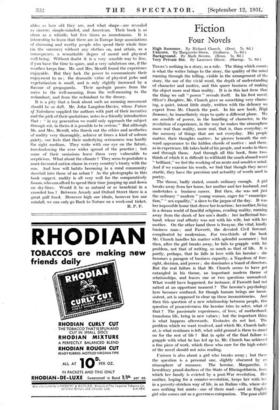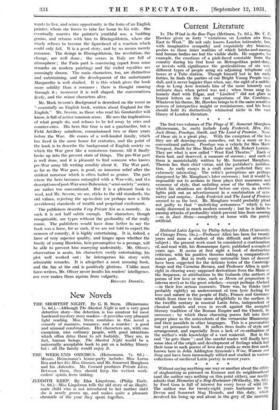Fiction
Four Novels THERE'S nothing in a story, as a rule. The thing which counts is what the writer brings to the story, the quality of the mind running through the telling, visible in the arrangement of the story, the use of the vivid word, the depth of understanding of character and motive, and this queer business of making the object more real than reality. It is in this last item that the thing we call " power " reveals itself. In his first novel, Oliver's Daughter, Mr. Church gave us something very charm- ing, a quiet, intent little study, written with the delicacy we expect from Mr. Church the poet. In his new book, High Summer, he immediately steps to quite a different plane. We are sensible of power, in the handling of character, in the revelation of experience, in the way he makes the atmosphere more real than reality, more real, that is, than everyday, or the memory of things that are not everyday. His people matter, their thoughts matter : he pierces beneath the out- ward appearance to the hidden chords of motive : and there, as in experience, life takes hold of his people, and works in them and through them. And through all this book, from two- thirds of which it is difficult to withhold the much abused word " brilliant," we feel the working of an acute and sensitive mind. And if' we examine his words, we find that though they never startle, they have the precision and actuality of words used in poetry.
The theme, badly stated, sounds ordinary enough. A girl breaks away from her home, her mother and her husband, and undertakes a business career. But then, she was not just the ordinary " modern " young woman, eager for " emancipa- tion," " sex-equality," a slave to the jargon of the day. It was her impossible home that drove her to action ; her mother, living in a dream world of fanciful religions, evading reality, running away from the shock of her son's death : her ineffectual hus- band, whose real affinity was not with his wife, but with her mother. On the other hand there is Swayne, the vital, kindly business man ; and Fawcett, the devoted Civil Servant, complicated by modernism. For two-thirds of the book Mr. Church handles his matter with splendid assurance ; but then, after the girl breaks away, he fails to grapple with his problem, not that of writing, so much as that of life. It is partly, perhaps, that he falls in love with his heroine : she becomes a paragon of business capacity, a Napoleon of fore- sight, decision, and power ; she dominates a board of directors. But the real failure is that Mr. Church seems to have got entangled in his theme, an important modern theme of relationships, and leaves one or two questions unresolved. What would have happened, for instance, if Fawcett had not ratted at an opportune moment ? The heroine's psychology here becomes confused, for though human beings are incon- sistent, art is supposed to clear up these inconsistencies. And then this question of a new relationship between people, this question of possessiveness the heroine tries to solve, what of that ? The passionate experiences, of love, of motherhood, transform life, bring in new values ; but the important thing is what happens afterWards. Ecstasies do not last. The problem which we want resolved, and which Mr. Church balks at, is what residuum is left, what solid grOund is there to stand on for the rest of life ? But in spite of the final failure to grapple with what he has led up to, Mr. Church has achieved a fine piece of work, which those who care for the high estate of the novel should not miss reading.
Unicorn is also about a girl who breaks away ; but there the question is a personal one, slightly obscured by an atmosphere of romance. The heroine, Margarethe, is hereditary grand-duchess of the State of Rheingoldstein, from which her family is evicted by a post-War revolution. Her mother, hoping for a connter-revolutiOn," keeps her with her in a poverty-stricken way of life, in an Italian villa, where she sees nothing but aunts—one of them mad—and an English girl who comes out as a govemess-coMpanion. The-poor ehild
wants to live, and seizes opportunity in the form of an English painter, whom she forces to take her home to his wife. She eventually marries the painter's youthful son, a budding genius, and returns with him to Rheingoldstein, where she wisely refuses to become the figurehead of a reaction which could only fail. It is a good story, and by no means merely romance. The doings in Rheingoldstein, the revolution, the change, are well done ; the scenes in Italy are full of atmosphere ; the Paris part is convincing (apart from some remarks on modern painting) and the exiled royalties are amusingly drawn. The main characters, too, are distinctive and entertaining, and the development of the unfortunate Margarethe is well studied. It is this which gives the book more solidity than a romance : there is thought running through it ; moreover it is well shaped, the conversations lively, and the minor characters alive.
Mr. Mark Severn's Background is described on the cover as " essentially an English book, written about England for the English." Mr. Severn, as those who read his Gambardier will know, is full of active common sense. He sees the implications of what people do, and refuses to be led away by cries and counter-cries. His hero this time is not a gambardier, but a Field Artillery subaltern, commissioned two or three years before the War. He comes of a well-landed family, which has lived in the same house for centuries, and the point of the book is to describe the background of English society on which the War grew like a monstrous tumour, till it finally broke up into the present state of things. The pre-War part is well done, and it is pleasant to find someone who knows pre-War army life writing sensibly about it. The War part, as far as the War goes, is good, an immense relief after the strident nonsense which is often hailed as genius. The part where the hero becomes entangled with a War-wife, and the descriptions of post-War semi-Bohemian," semi-society " society are rather too conventional. But it is a pleasant book to read, and Mr. Severn, we see, sticks to the old standards, the old values, rejecting the up-to-date (or perhaps now a little overblown) standards of wealth and perpetual excitement.
The publishers describe Very Private Sin as a comedy. As such it is not half subtle enough. The characters, though recognizable, are types without the profundity of the really comic. The publishers would have done better to say the book was a farce, for as such, if we are not told to expect the acumen of comedy, it is highly entertaining. It is, indeed, a farce of very superior quality, and hinges upon whether the family of young Hawkins, heir-presumptive to a peerage, will be able to prevent him marrying undesirably. Mr. Oliver's observation is acute, his characters vastly entertaining, his plot well worked out : he intersperses his story with admirable remarks. It is altogether a most amusing book, and the- fun at the end is positively glorious. Unlike most farce-writers, Mr. Oliver never insults his readers' intelligence, nor ever makes them squirm from vulgarity.
BONAMY DOBRIE.































 Previous page
Previous page